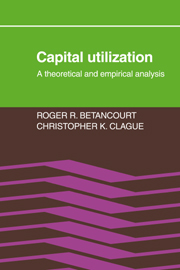Book contents
- Frontmatter
- Contents
- List of tables and figures
- List of propositions
- Preface
- Glossary of symbols
- Introduction
- 0 A preliminary view of capital utilization
- Part I Shift-work and the theory of the firm
- Part II Estimation
- 4 The estimation framework
- 5 Econometric literature on capital utilization: an interpretation
- 6 Empirical implementation
- Part III Results
- Part IV Implications
- References
- Index
4 - The estimation framework
Published online by Cambridge University Press: 05 March 2012
- Frontmatter
- Contents
- List of tables and figures
- List of propositions
- Preface
- Glossary of symbols
- Introduction
- 0 A preliminary view of capital utilization
- Part I Shift-work and the theory of the firm
- Part II Estimation
- 4 The estimation framework
- 5 Econometric literature on capital utilization: an interpretation
- 6 Empirical implementation
- Part III Results
- Part IV Implications
- References
- Index
Summary
Bridging the gap between the theory and the data is frequently a difficult task in economic research. Successful accomplishment of this task is the aim of the estimation process. This process, which is the focus of the second part of this book, will be critically influenced by the nature and implications of the theory, the characteristics of the data, and the purpose of the estimation.
The principal purpose of the estimation in our context is, of course, the testing of the theory of capital utilization presented in the previous part of this book. We lay the foundation for such testing in this chapter through an analysis of the implications of certain characteristics of the theory (and to a lesser extent of the data) for the estimation process. Without going into details at this point, it is worth noting that the analysis in this chapter yields insights of interest and significance for the empirical analysis of other qualitative variables as well as shiftwork. By contrast, in the next chapter the discussion focuses exclusively on capital utilization or shift-work; there we use the theoretical results from Part I and the results from this chapter to provide a novel interpretation of previous attempts at testing the theory. In so doing we furnish a review of the existing econometric literature on capital utilization. In Chapter 6 we describe in detail the procedures employed to implement the models empirically.
- Type
- Chapter
- Information
- Capital UtilizationA Theoretical and Empirical Analysis, pp. 67 - 89Publisher: Cambridge University PressPrint publication year: 1981



